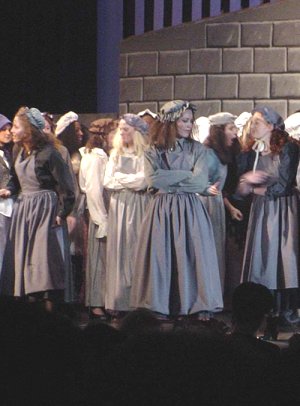|
February 14, 2003
Friday
More than twenty years ago composers Alain Boublil and Claude-Michel Schoenberg adapted Hugo's work as a musical for the French stage. In 1985 they worked with producer Cameron Makintosh on an English version which opened in London and then came to New York in 1987. My experience with Broadway musicals is almost entirely in some sort of high school production capacity, either as pit musician, backstage crew, or enthusiastic supporter of the student-participants, so I didn't pay much attention to this show beyond wondering just how one made such sweeping, epic, and heavy themes suitable for the small stage.
Casting for this show took place in November and rehearsals began before Christmas break. In ninth grade and tenth grade (when the shows were Hello Dolly! and The Sound of Music) Lynn seemed content with a place in the chorus. This year she emboldened herself to try for a featured role, either that of Cosette or Eponine (the young women who figure in the secondary love story). She was terribly disappointed that she wasn't chosen for either, and further disappointed when the auditions for featured dancers took place on a day when she had to be representing the school at district chorus. Readers of this space know that nearly everything Lynn does delights me. After she failed to get the part she wanted, she came home and stamped her foot, screamed her anguish in language we seldom hear from her, threatened to quit the whole enterprise, and then accepted the situation and threw herself into being the best nameless wretch she could be. As I said the other day, she's perfect. This show, with its difficult staging and its somber themes, presents more of a challenge for high school students than any other show I can think of. Ron and I attended last night's opening performance along with Ron's older daughter Patty and her husband, who had come up from Philadelphia for the occasion. As parents, we come to such events to see our children and their friends. When there are a lot of people you love and care about on stage, you're willing to accept what they offer and to take joy in it. But even to a stranger's eye, this production had much to praise. That our students performed well and convincingly is testament not only to their talent, but to the leadership that helped them shape their performances. To get youngsters who have never known desperation to portray desperate people without seeming hollow is a great accomplishment. To get forty kids to stay in character and create the illusion that they number four hundred is an achievement of coaching and directing. When they raised their red flag (the blood of angry men) for the first time at the barricade, I was ready to join them in their cause, and I know that their ability to elicit that emotion from an audience member meant that somebody taught them what the cause meant to those people and helped them to feel it themselves, at least to a certain degree. In his welcome message in the program, director George Kell (who is not a staff member of the school) acknowledged that this mammoth undertaking would not have been possible without the school's "unwavering commitment to the performing arts." He also addressed some of the difficulties in having high school students portray evil or oppressed individuals who sometimes express themselves in ways judged unacceptable or make choices many people regard as immoral. In the end, he said, the play is about the eternal struggle to keep to the law and to dispense righteous grace. Food for thought in these troubled times.
|
 At
left you see Lynn in character last night in the area's first high
school
production of Les Miserables. (She's the one in gray dress and
cap,
arms crossed, looking to her left and scowling.) It's the scene in the
first act just before Fantine sells her hair and then herself to
support
her daughter Cosette. Lynn is one of the factory workers who is angry
with
and distrustful of Fantine. Lynn also appears as one of the "lovely
ladies"
who work on the docks, as a customer at the inn of the Thenardiers, and
as one of the company of former wretches who sing that they will not be
slaves again.
At
left you see Lynn in character last night in the area's first high
school
production of Les Miserables. (She's the one in gray dress and
cap,
arms crossed, looking to her left and scowling.) It's the scene in the
first act just before Fantine sells her hair and then herself to
support
her daughter Cosette. Lynn is one of the factory workers who is angry
with
and distrustful of Fantine. Lynn also appears as one of the "lovely
ladies"
who work on the docks, as a customer at the inn of the Thenardiers, and
as one of the company of former wretches who sing that they will not be
slaves again.